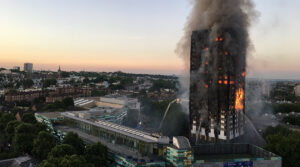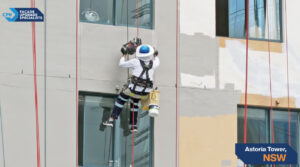When it comes to 10 Crucial Questions to Ask Your Australian Facade Remediation Contractor Before Signing, building owners, strata committees, and managers can’t afford to leave things to chance. Choosing the wrong facade remediation contractor in Australia could mean cost blowouts, unsafe outcomes, or repairs that don’t last. This guide equips you with the most important questions to ask, ensuring your project is handled by experts who deliver safe, long-lasting and cost-effective results.
Why Choosing the Right Facade Remediation Contractor Matters
Australia’s high-rise and difficult-access buildings face ongoing challenges: ageing cladding, water ingress, structural cracking, and compliance with post-Grenfell fire safety regulations. Whether you’re in Sydney, Melbourne, Brisbane, or Perth, the wrong contractor choice can expose owners and committees to:
- Financial risk – unexpected levies or ballooning costs.
- Safety hazards – poor workmanship or non-compliant cladding.
- Resident complaints – noise, dust, and disruptions.
- Future repairs – quick fixes that fail within years instead of decades.
By asking the right questions, you protect your building’s value and reputation, while ensuring residents’ safety and peace of mind.
1. Do You Specialise in Facade Remediation or Just General Repairs?
Not all contractors are equal. Some may claim to handle facade work, but primarily operate as general builders or painters. You need a facade remediation contractor Australia with specific expertise in building facade remediation, facade repair, and cladding restoration.
Look for:
- Proven track record in high-rise projects.
- Knowledge of compliance requirements in NSW, VIC, QLD, and WA.
- Proprietary systems that reduce costs and disruption.
For example, CPR’s Scaffold-Free™ technologies such as SkyPod® Workstations and PEARS® Elevation Systems provide safer, faster and quieter access without scaffolding.
2. What Licences, Accreditations, and Insurance Do You Hold?
Hiring a contractor without the right paperwork is a recipe for disaster. Before signing, confirm:
- Builder’s licence and remedial works registration.
- Public liability and workers’ compensation insurance.
- Accreditation with peak bodies such as Master Builders Australia or the Australian Corrosion Association.
This ensures you’re dealing with a qualified facade restoration contractor, not a company cutting corners.
3. How Will You Diagnose the Facade Problems?
Accurate diagnosis prevents wasted money. Ask contractors how they’ll identify defects:
- Do they provide a facade remediation checklist?
- Will they carry out a full dilapidation survey?
- Do they map and quantify every defect across the facade?
Industry leaders like CPR use Sky Facade Scope 360® to divide exteriors into grids and deliver photographic records of every defect. This ensures complete transparency before any work begins.
4. Can You Show Me Case Studies of Similar Projects?
Real-world proof matters. Ask for case studies of completed projects in:
- Sydney (e.g. facade contractor Sydney strata towers).
- Melbourne (facade contractor Melbourne heritage precincts).
- Brisbane (facade repair Brisbane waterfront buildings).
- Perth (facade remediation Perth commercial complexes).
A reliable provider should show before-and-after photos, timelines, budgets, and references from strata committees or building managers.
5. What Access Systems Do You Use?
Scaffolding is outdated, disruptive, and costly. It can add 30% or more to your project budget. Ask:
- Do you rely on scaffolding or offer modern access solutions?
- What safety systems are in place for tradespeople?
- How will you minimise disruption to residents and businesses?
With systems like MARS™ (Multiple Access Rope System) and Upseiling®, CPR eliminates the need for scaffolding, delivering cost savings, quicker timelines, and higher quality outcomes.
6. How Do You Assure Quality During the Project?
One of the biggest risks in hiring is poor workmanship hidden behind fresh paint. Ask contractors:
- How do you document repairs?
- Do you use photographic or digital records?
- How are quality checks embedded into the process?
CPR’s Sky End-2-End Project Care® system documents every repair by drop, level, and patch number, ensuring complete transparency.
7. How Long Will the Repairs Last?
It’s not enough to fix the problem today – you need durability. A trustworthy contractor should provide:
- Warranties on workmanship.
- Long-term maintenance options.
- Examples of projects still performing well 10–15 years later.
If the answer sounds vague, it may be a red flag. CPR, for example, emphasises multiple decade solutions, reducing the need for repeat works.
8. How Will You Minimise Resident Complaints and Disruption?
Strata committees know the pain of constant complaints. Questions to ask:
- Will noisy equipment or scaffolding block balconies?
- How will you control dust and debris?
- Do you work unobtrusively without entering apartments?
CPR’s encapsulated SkyPod® design contains dust and debris, while rope-based access means no residents are disturbed.
9. What Transparency Will I Have Over Costs and Progress?
Hidden costs destroy trust. Before you sign, demand answers to:
- Will you provide transparent, itemised quotes?
- Can I access project records in real time?
- Do you offer photographic evidence of completed works?
Contractors using cloud-based systems like CPR give committees 24/7 access to inspection reports and progress updates.
10. What Aftercare or Ongoing Support Do You Offer?
A facade is not “fix and forget”. Ask contractors:
- Do you offer ongoing inspections and maintenance?
- Is there a standalone service for preservation?
- What happens if issues reappear?
With CPR’s AfterCare™ programme, owners gain long-term preservation support and peace of mind beyond project completion.
Signs You Might Already Need Facade Remediation
Even before asking these questions, look for warning signs that your building may require urgent attention:
- Cracks in cladding or concrete.
- Water leaks or ingress.
- Rust stains around windows.
- Loose tiles or panels.
- Resident complaints about safety.
These are clear signs you need facade remediation and shouldn’t be ignored.
Contractor Selection: Red Flags to Avoid
Not every contractor deserves your trust. Avoid companies that:
- Offer suspiciously low quotes without detailed breakdowns.
- Push for scaffolding when modern alternatives exist.
- Can’t show long-term references or guarantees.
- Lack insurance or valid trade licences.
- Seem vague on compliance with fire safety or cladding regulations.
How to Choose a Facade Contractor in Australia
In short, the best approach is:
- Compile a facade remediation checklist based on these 10 questions.
- Compare providers across Sydney, Melbourne, Brisbane, and Perth.
- Look for innovation, transparency, and proven outcomes.
- Ensure warranties and aftercare are part of the package.
If you want the best facade contractor Australia has to offer, consider working with specialists who not only remediate but also consult, preserve, and future-proof your building.
Take the Next Step with CPR
Before signing anything, make sure you’re dealing with Australia’s trusted remediation specialists. CPR provides consultancy, preservation, and remediation services for difficult-access buildings across strata, commercial, government, industrial and heritage sectors.
- Explore Facade Consultancy Services: Learn more here
- Discover Facade Remediation & Preservation: See full service details
With CPR’s Scaffold-Free™ systems, you’ll save time, money, and stress – while protecting your building’s safety, compliance, and long-term value.






